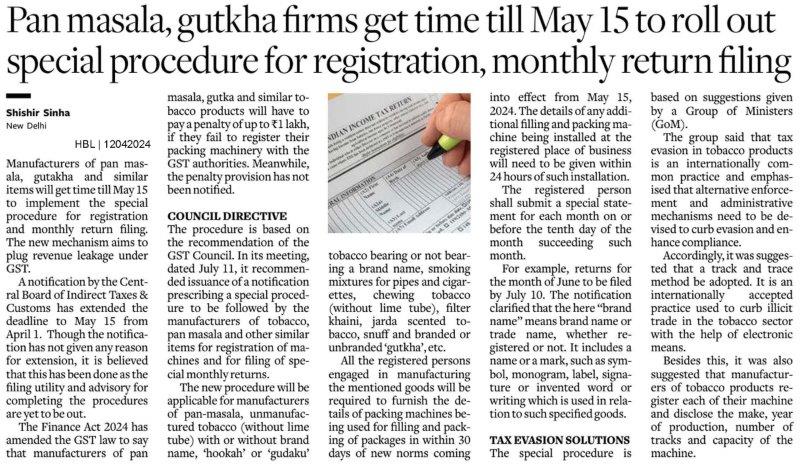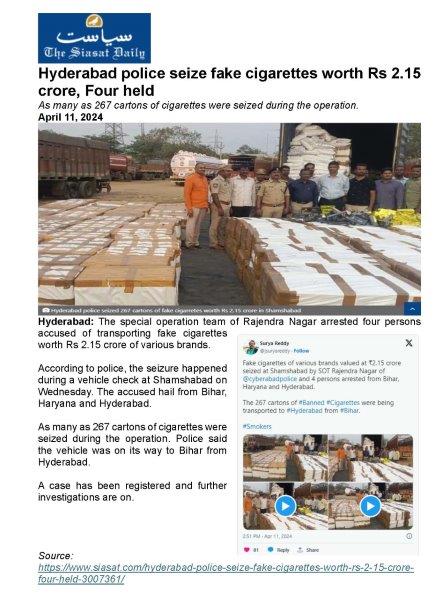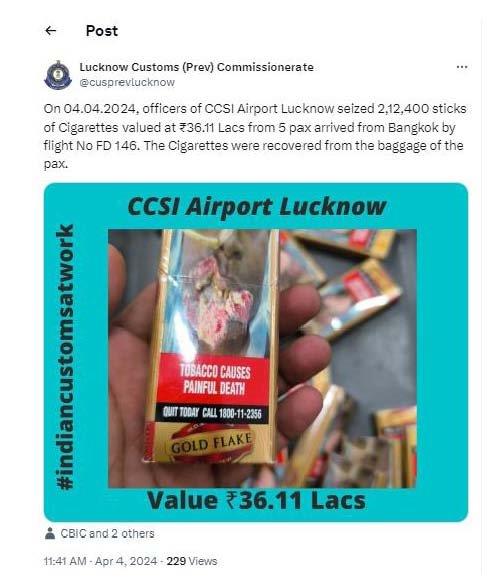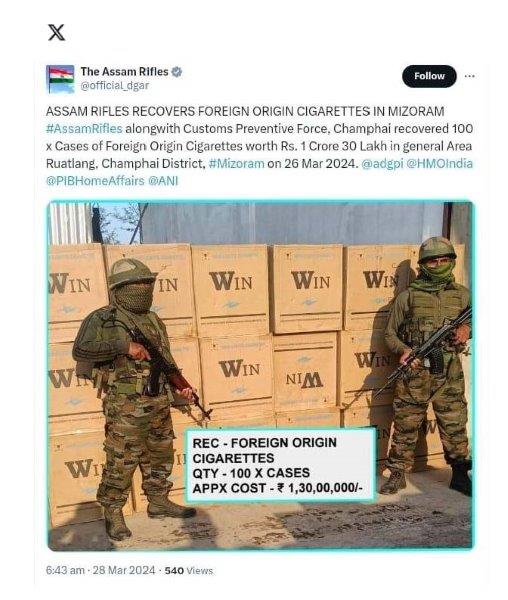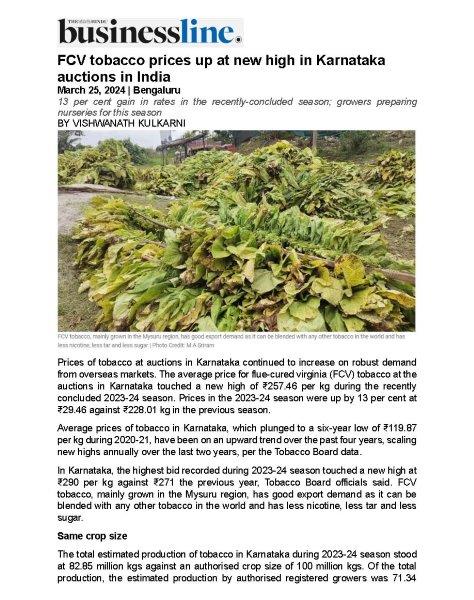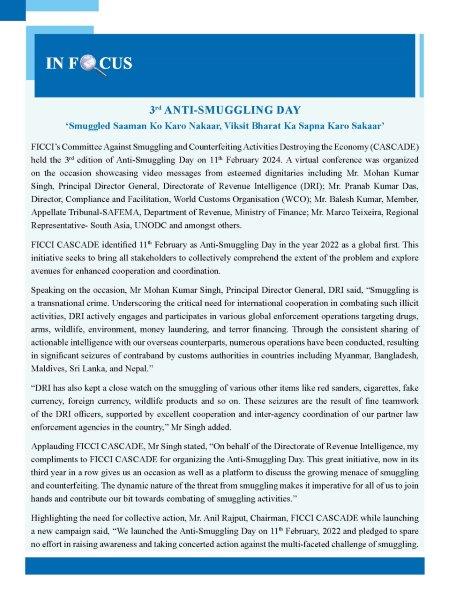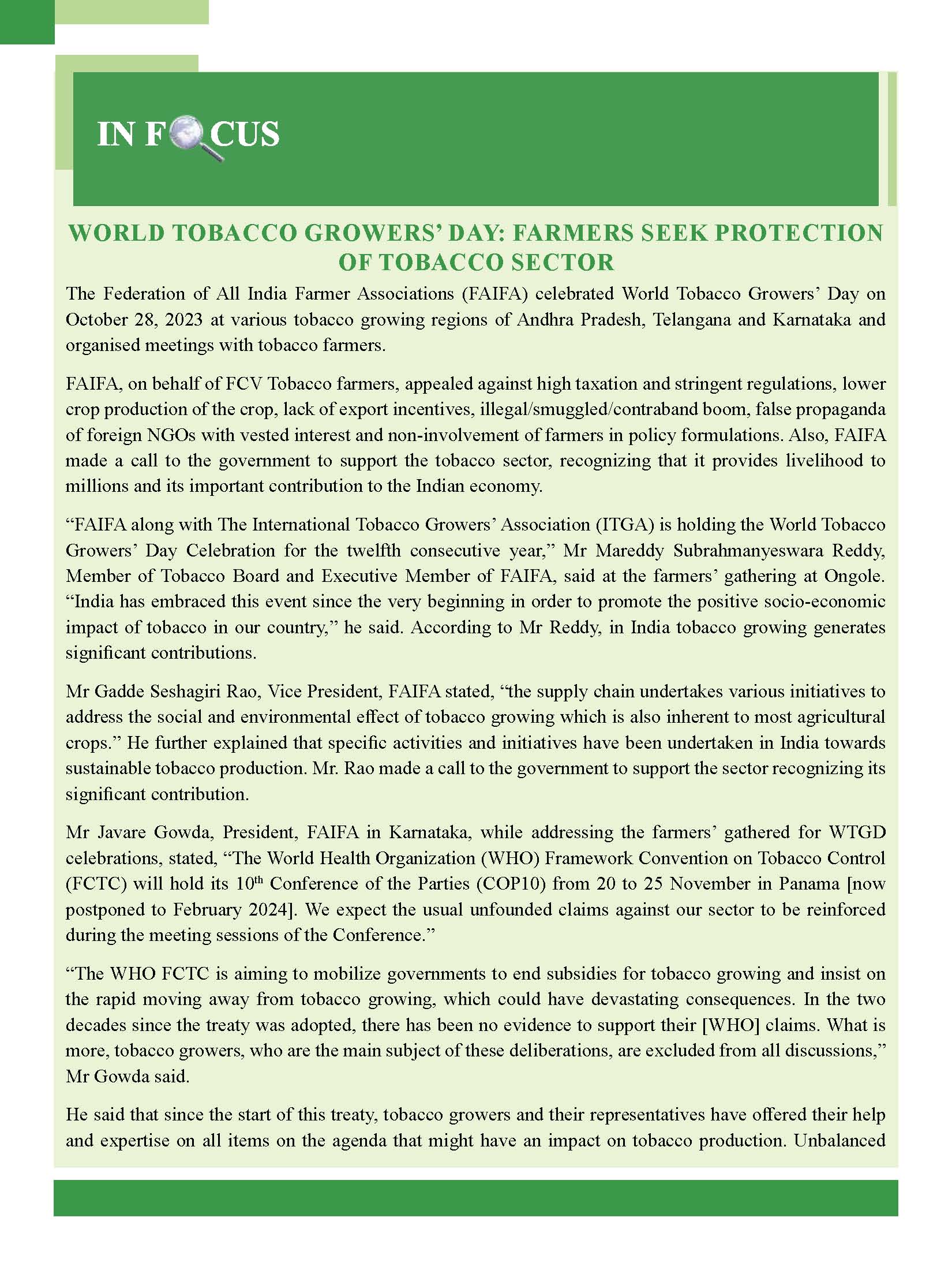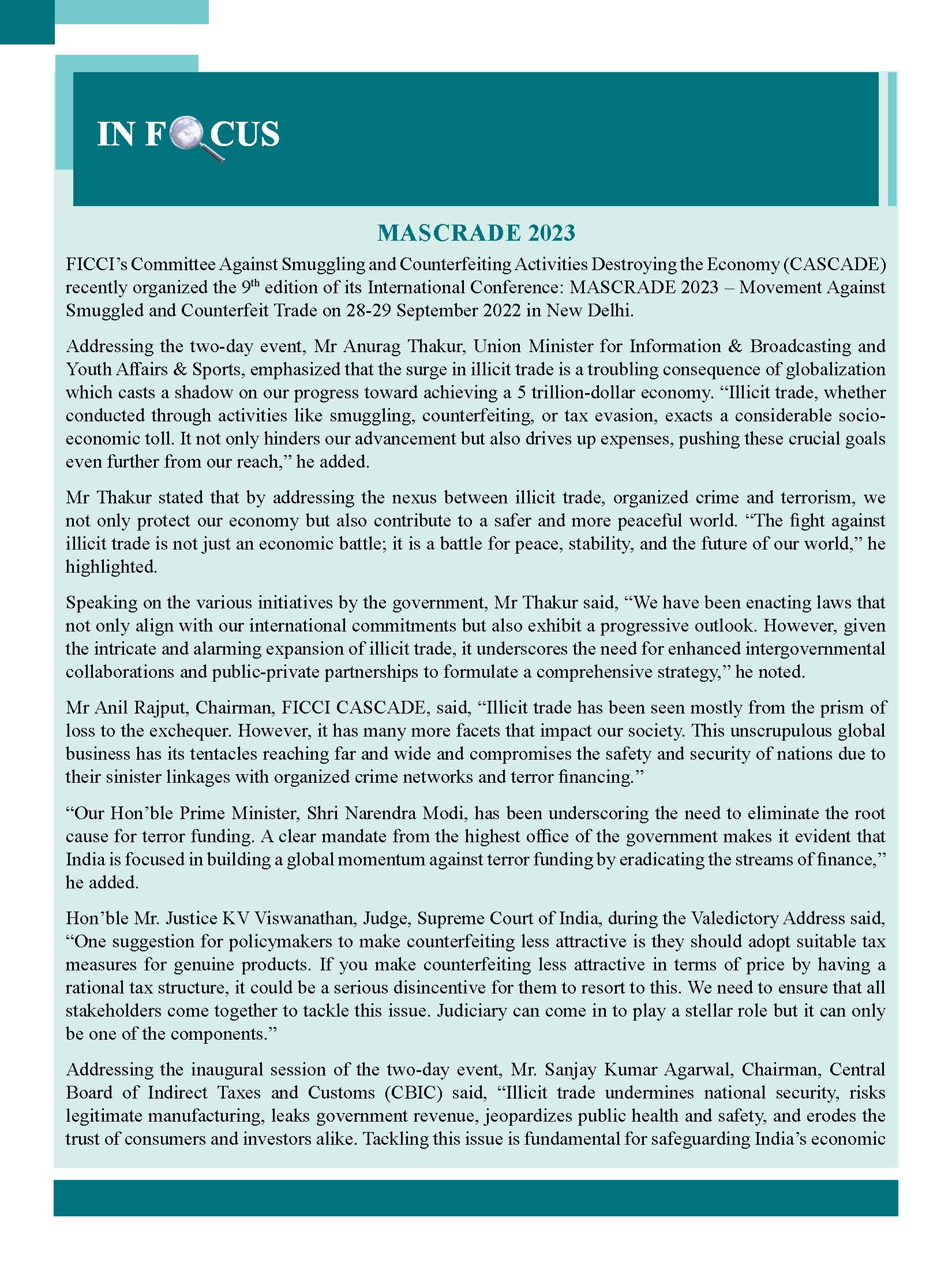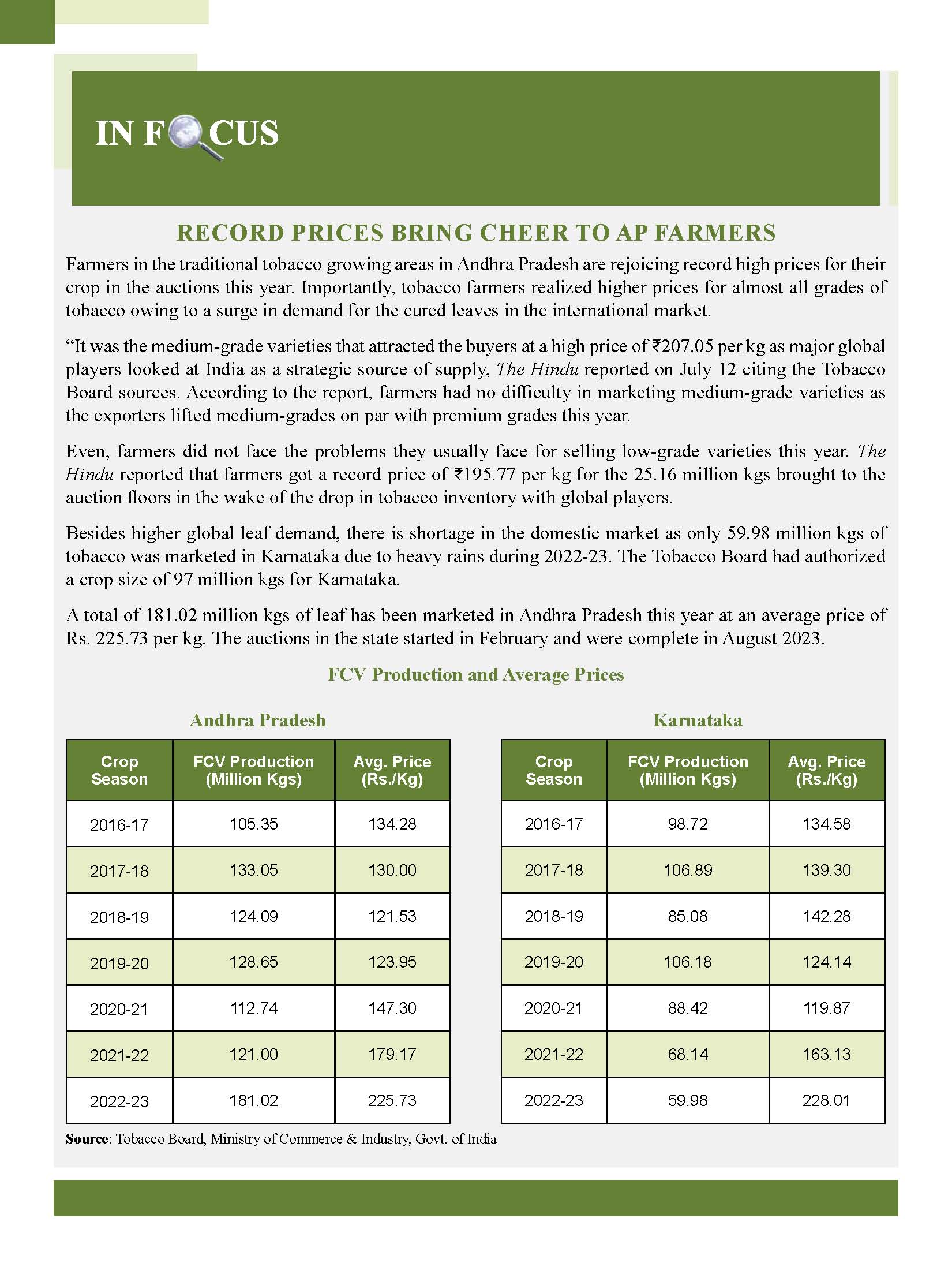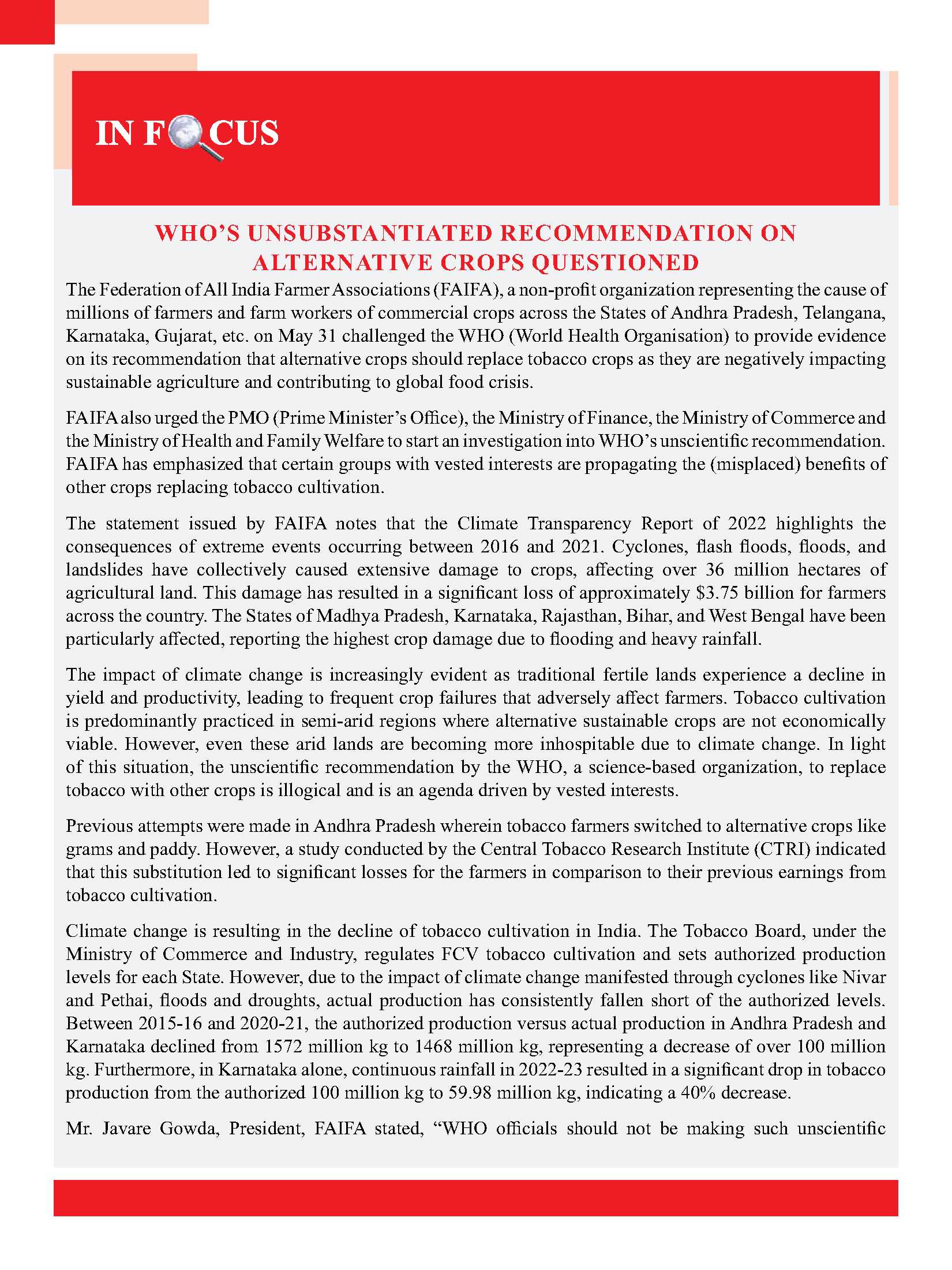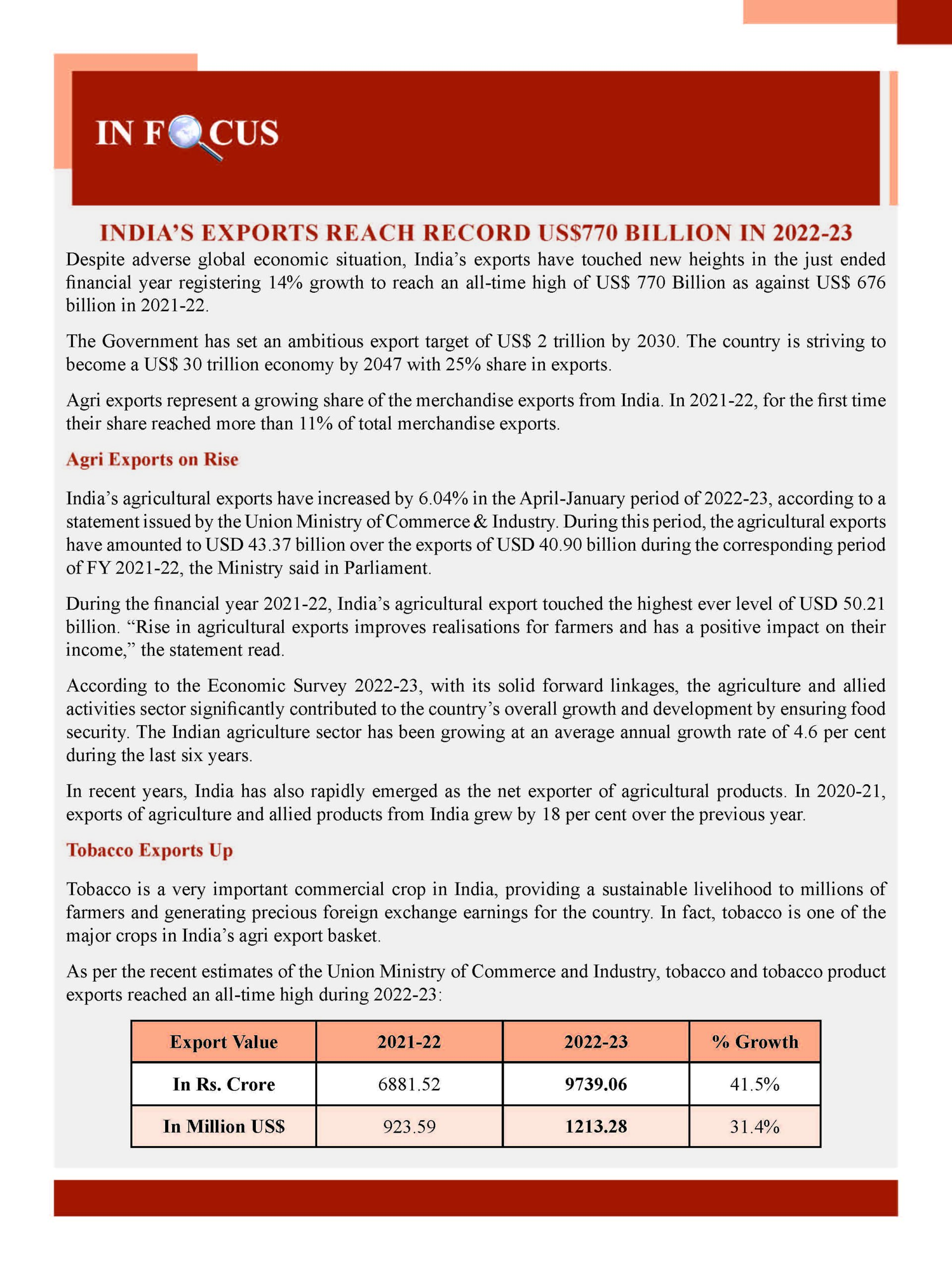FCTC – A Threat to Livelihood
The Framework Convention on Tobacco control (FCTC) is the international treaty negotiated under the auspices of the World Health Organization (WHO). The FCTC was adopted at the 56th World Health Assembly on May 21, 2003 and it came into force on February 27, 2005.
The stated objective of the FCTC is to provide “a framework for tobacco control measures to be implemented by the Parties at the national, regional and international levels in order to reduce continually and substantially the prevalence of tobacco use and exposure to tobacco smoke.”
Key FCTC Recommendations having Adverse Impact in India
- Denial of access for consultation and interaction with policymakers Article 5.3
- Excessively high taxation on legal tobacco products Article 6
- Regulation & disclosure of tobacco product contents Article 9&10
- Forcing farmers away from tobacco cultivation without there being any feasible alternative crop Article 17
However, going much beyond the stated FCTC objective, to which signatory nations have subscribed, the former WHO Chief, Director General Dr. Margaret Chan, had urged coordinated global action to drive the tobacco industry, a legal enterprise employing and providing livelihood to millions around the world, out of business. Ms. Chan had gone on record to state, “it’s going to be a tough fight…… (but) we should not give up until we make sure that the tobacco industry goes out of business.” World Conference on Tobacco or Health’ (Abu Dhabi, March 18, 2015).
It is important to understand that the objective of “pushing the tobacco industry out of business” cannot be an isolated targeting of cigarette companies alone. Any initiative pursued in this direction through extreme Proposals and Guidelines by the FCTC will have an impact on the entire tobacco value chain from tobacco farmers and farm workers to small, self-employed retailers.
There is a vast livelihood dependency of 45.7 million people on tobacco in India and huge socio-economic importance of tobacco cultivation to the country. It follows that any tobacco control policy recommended by the FCTC that threatens the livelihood of such a large number of Indians can lead to major social unrest particularly in the rural areas.
It is important for the Indian Government to take cognizance of the fact that Tobacco Control regulations recommended by the FCTC are not binding on countries. The FCTC Guidelines allow National Governments to adopt a flexible approach in policy adoption considering their local conditions and domestic priorities.
A convention like the FCTC merely serves as guidelines that may be taken into consideration while framing such policies. The guiding principles of FCTC itself states, “… take into consideration local culture, as well as social, economic, political and legal factors……”
Mere ratification of the FCTC by any country does not create legal obligations on national governments. It is for the Parliament to consider the guidelines contained in the FCTC whilst framing law. Only those provisions of FCTC which have been specifically incorporated by the Parliament through a suitable legislation can be binding on the people of this Country.
Excessive and unreasonable FCTC proposals are being driven by anti-tobacco activists at the behest of vested interests. These proposals could wipe out the livelihood of millions of tobacco growers in many countries such as India where cultivation of tobacco has huge socio-economic importance. It is unfortunate, that the challenges faced by farmers and farm workers in rural areas and other ground realities are completely ignored by the FCTC.
In fact, several important tobacco producing countries namely USA, Indonesia, Argentina etc. have not yet ratified the WHO’s Framework Convention on Tobacco Contorl (FCTC). However, India was one of the earliest signatories to the FCTC and also the 8th country to have ratified it in February 2004 despite the huge livelihood implication as the second largest tobacco growing country in the world and the 45.7 million livelihood dependency on tobacco.
FCTC recommendations on diverse issues such as Agricultural Practices, Tobacco Product Content Regulation & Disclosure, Denial of Access for Consultation to tobacco industry, Benchmarked Taxation etc. have very tangible real life implications for farmers and others dependent on tobacco for their livelihood. Such restrictions on tobacco cultivation and the legal tobacco industry can only be at the cost of the Indian economy and to the benefit of other tobacco growing countries and illegal trade in cigarettes.
It is also a matter of concern that the FCTC process has become increasingly undemocratic and non-transparent with decisions made behind closed doors, and media, the public and tobacco growers explicitly excluded from the deliberations. In fact, it is ironic that tobacco farmers, farmer organizations and other stakeholders who are directly affected by FCTC proposals/decisions are deliberately kept out of the FCTC Conference of the Parties (COP).
The non-transparent manner in which the FCTC COP sessions are conducted defy international norms and standards that should govern the conduct of international organizations including bodies established under the FCTC and the WHO. The ‘Guidance Note of the Secretary-General (UN Secretary General) on Democracy’ very clearly enunciates that “Popular participation, collective deliberation and political equality are essential to democracy, and should be realized through a framework and structure of accessible, representative, transparent and accountable institutions subject to periodic change or renewal.”
In fact, Dr. Margaret Chan, the former Director-General of the World Health Organization, under whose auspices the FCTC COP Meetings are held, at the Measurement and Accountability for Results Health Summit, Washington, DC, USA, 9 June 2015 had gone on record to pronounce that “In this day and age, where transparency is such a big commodity, there is no other option but to have transparency and accountability…. The emphasis on transparency, accountability, and measureable results is increasing every day.” Dr. Chan’s statement above reinforces the UN principles of transparency, democratic processes and participation.
It is vital that tobacco experts and relevant bodies with the requisite technical knowledge on tobacco growing be allowed to participate in FCTC discussions in order to safeguard the legitimate interests of tobacco growers and other Industry stakeholders.
The Indian Government should not get swayed by the propaganda of the international NGOs who under the misguided notion that FCTC Guidelines are mandatory on the Indian Policy Makers, campaign for unreasonable regulations and should instead promote a balanced approach towards tobacco control regulations. India should also ensure that unreasonable and impractical proposals and guidelines which will have devastating impact on tobacco farmers and millions of others who are dependent on tobacco for their livelihood are not adopted by the FCTC.
Indian Government should leave its footprint on global tobacco policy by promoting balanced regulations that include the interests and livelihoods of millions of small farmers and rural workers across the world.
FCTC Not Mandatory on Indian Govt.
Various tobacco control activists and NGOs backed by overseas vested interest continue to wage a relentless campaign to influence Tobacco Control Policies in the country and promote a false propaganda that the Indian Government is obligated under the FCTC to implement all provisions of the FCTC and introduce further regulations in the country which are excessive in nature and inimical to tobacco cultivation and the tobacco farming community. This premise is not only seriously flawed but is also legally untenable.
Sovereign powers of the Parliament, which includes the power to implement international treaties and agreements, cannot be delegated. The idea that FCTC can be ‘implemented’ at all is based on an erroneous understanding of the FCTC. The FCTC is not a binding document — it does not create any obligation for signatory nations to implement provisions of the Treaty. It is for the Indian Parliament to consider the guidelines contained in the FCTC whilst framing law. Only those provisions of FCTC which have been specifically incorporated by the Parliament through a suitable legislation can be binding on the people of this Country.
The operating Tobacco Control law in India is the Cigarettes and other Tobacco Products (Prohibition of Advertisement and Regulation of Trade and Commerce, Production, Supply and Distribution) Act 2003 (COTPA) and all regulations in this regard must be within the purview and framework of this Act of the Indian Parliament. Despite Indian having a comprehensive tobacco control law, anti-tobacco NGOs are misusing FCTC to propagate unreasonable policies and are citing FCTC in litigations to pressurize Indian Policy Makers.
It is for each country to evolve its own policy in the light of the unique conditions such as the economic importance of the crop; health needs; the extent of dependence on a particular industry; revenue generation etc. prevalent in that country. A convention like the FCTC merely serves as guidelines that may be taken into consideration while framing such policies. The guiding principles of FCTC itself states, “… take into consideration local culture, as well as social, economic, political and legal factors……” in implementing provisions of the FCTC. The model of other countries where the economic significance of tobacco is low cannot be followed in India.
It is incumbent on the Government to consider the views of all citizens, including the stakeholders – the persons that would be directly affected by a proposed law. The FCTC is a treaty negotiated under the auspices of World Health Organisation that is recommendatory in nature. The parties to the treaty are free to decide the scope of their tobacco control framework. FCTC is not the law of the land.
Therefore, the Government of India should formulate tobacco control policies within the framework of the law i.e. COTPA passed by the supreme law-making institution of the country which is the Indian Parliament. India’s tobacco regulations should be specifically adapted to the conditions prevailing in the country so that they do not jeopardize the livelihood of millions who are engaged in the tobacco industry.
Stakeholder Participation is Vital in FCTC Proceedings
Being a sovereign and democratic country where tobacco generates significant socio-economic benefits in terms of remunerative agricultural employment, revenue and foreign exchange earnings etc., the Government of India should undertake prior consultation with farmers and other Industry stakeholders and include stakeholder representatives in the official Indian delegation to the FCTC COP Meetings.
As per the UN recommendations, democratic process is fundamental to all policy making both at an international and at the national level. Article 21 of the Universal Declaration of Human Rights, 1948 adopted by the UN General Assembly declared that “Everyone has the right to take part in the government of his country, directly or through freely chosen representatives” and that “The will of the people shall be the basis of the authority of government”.
Moreover, the Guidance Note of the UN Secretary General on Democracy, while emphasizing the central role of democracy in the fulfillment of the goals of the UN, states that, “UN democracy assistance should aim to support legitimate democratic forces, provide a platform for expression of diverse viewpoints and perspectives, connect these forces to global knowledge and expertise, including south-south collaboration, and nurture a national environment open to transparent and democratic political discourse, transition and change.”
The Guidance Note further goes on to stipulate that, “Efforts should be made by the UN to actively engage with traditionally marginalized and excluded groups………….rather than focus on engaging a small group of likeminded national actors as is often the case.”
These emphatic observations show that participation of all constituents and stakeholders, especially those with diverse views or traditionally marginalized voices is a central tenet followed by the United Nations in carrying out its programmes all around the world. Towards this, the Guidance Note lists out the Areas of Focus for UN action, including providing “political facilitation”. As stated in the Guidance Note, “Political facilitation can take many forms, including mediation and negotiation, convening forums for policy discussion, supporting inclusive processes and national dialogue based on democratic values and principles.”
The Conference of Parties organized under the aegis of FCTC which is a framework convention under the World Health Organisation, a UN agency, should therefore, be carried out in an inclusionary manner and in line with the basic tenets of democratic process adopted by the UN.
Further, the Preamble to the FCTC itself recognizes the need to consider the livelihood and economic interests of tobacco growers and workers in implementing its provisions. Throughout the provisions of the FCTC and especially in Articles 6 to 14 which describe various legislative, executive and administrative measures which may be undertaken by Parties, it is explicitly recognized that their implementation is subject to “national law”, “national circumstances and priorities” and can be done only “in accordance with [the] constitution and constitutional principles” of the Parties.
Under the Indian Constitution, any international instrument which contemplates restrictions on the rights of Indian citizens can be given effect to only by law made by Parliament. This principle, which has been laid down in various decisions of the Supreme Court of India, places the values of democratic process and participatory governance above any international instrument or convention.
On the other hand, NGOs and anti-tobacco activists in India are engaged in waging a huge campaign to influence government’s tobacco control policy and to promote extreme regulations without any appreciation of the socio-economic importance of tobacco in the country and the vast livelihood dependency on the crop. These anti-tobacco groups are likely to seek to influence the Government position on the various Articles of the FCTC leading to the undermining of the interest of the tobacco farmers and other industry stakeholders and the adoption of a stance by the Government that is not evidence-based.
Worryingly, FCTC processes have become increasingly undemocratic, non-participatory and opaque with decisions made behind closed doors with media, the public and tobacco growers explicitly excluded from the deliberations. It is ironic and a travesty of justice that, tobacco farmers, farmer organizations and other stakeholders who are directly affected by FCTC proposals and decisions are deliberately kept out of the COP Meetings.
It is therefore, important that policy development in this area is not left to the tobacco control activists and NGOs alone. Instead and in order to arrive at balanced and pragmatic position on various proposals and guidelines at these Conference, the Indian Government should engage extensively with the Industry Stakeholders on the FCTC Articles contained in the Conference Agenda and also include Industry Stakeholders and representatives from the Farming Community in the official Indian delegation to these Conference.
Besides, tobacco experts from the Ministry of Commerce & Industry, Ministry of Agriculture and Ministry of Labour should be consulted with regard to FCTC Articles and officials from these ministries should form a part of the Indian delegation to the bi-annual Conference.
This will ensure that the Industry view point on various issues arising out of the Agenda is taken cognizance of and no unilateral and discriminatory one-sided decision is taken by the Parties to the Conference that is inimical to the livelihood of millions dependent on tobacco in India.
As the world’s 2nd largest producer, tobacco is an extremely important commercial crop for India. It provides livelihood to 4.6 crore people, including farmers, farm labour, rural poor, small self-employed retailers, women, tribals etc., more than 70% of whom are engaged in the agricultural sector and have no other means of sustenance. Any decision arrived at the COP Meetings unilaterally without taking the views of those that derive their livelihood from tobacco and which is not based on livelihood considerations will have a devastating impact on farm incomes and the lives of millions that are dependent on tobacco.
The Government of India should, therefore uphold the high democratic principles of the India Constitution and facilitate the participation of tobacco farmers and other industry stakeholders in the proceedings of the FCTC COP Meetings.
In fact, inclusion of the various stakeholders is crucial to ensure evidence-based, balanced and pragmatic tobacco control policies not only in a global health forum such as the FCTC Conference but also in any national policy-making effort.
Thus, neither the WHO nor the Governments should ignore the crucial role of stakeholders in the policy-making process. This approach acquires special significance in a large tobacco growing and exporting country like India where tobacco is a very important commercial crop providing sustainable living to millions of people and garnering significant revenue and foreign exchange earnings for the country.
FCTC Article 5.3 is Arbitrary & Undemocratic
The Guidelines on Article 5.3 of the FCTC are designed to keep the Tobacco Industry out of any consultation with the Government and its various agencies/bodies on Tobacco Control policy regulations and proposals.
The Government of India is under no mandatory obligation to implement any of the provisions or guidelines of the FCTC. The Guidelines of the FCTC are recommendatory in nature and are not binding on a sovereign republic such as India.
Any policy to exclude the tobacco industry and its various stakeholders, from participating in any deliberations of laws and regulations that will inevitably result in the curtailment of their rights is unilateral, arbitrary and against all democratic principles enshrined in the Constitution of India. Moreover, any agreement by the Indian Government to implement the Article 5.3 Guidelines will adversely affect the livelihood of millions of citizens engaged in lawful economic activity.
Various Government agencies in India such as Tobacco Board and Central Tobacco Research Institute (CTRI) are inseparable from the tobacco growers and trade due to their interlinked objectives and organizational mandate. These agencies are inseparable from the growers and trade as they
constantly interact with the tobacco farmers, trade and Industry. This interaction is essential and ensures the protection of the interests of a large number of tobacco farmers in the country.
Further, any attempt to deprive a group of citizens of the right to make representations and to participate in the policy-making process would be inherently unfair, undemocratic and abhorrent to the Constitution of India. Such a recommendation is shocking, and if permitted, would set a precedent for legislatively preventing citizens from voicing their grievances to the Executive concerning proposed law on a legal product and economic activity.
The FCTC nowhere requires the signatories to implement national law to reflect all aspects of FCTC. In fact, the FCTC expressly makes Article 5.3 subject to the law of the respective signatory country.
The Constitution of India does not empower the Union or the States to deny the right to be heard to any industry.
Keeping with the noble principles of democracy and individual rights of citizens enshrined in the Indian Constitution and in recognition of the vast livelihood dependency of millions on tobacco in the country, the Guidelines on Article 5.3 of the FCTC must not be adopted for implementation in India.
FCTC Article 6 Recommendations will
Boost Illegal Cigarette Trade
The guidelines and recommendations for the implementation of FCTC Article 6 overlook the undesirable consequences of high and discriminatory taxation on cigarettes in a country where the bulk of tobacco consumption is in the form of non-cigarette tobacco products which are either lightly taxed or escape taxation. In fact the guidelines will only result in widening the tax gap between cigarettes and other tobacco products and will not even help in achieving the objective of tobacco control in the country. The tobacco consumption pattern in India is unique in that only 9% of total tobacco is consumed in the form of legal Cigarettes. The remaining 91% consumption is in the form of 29 cheaper tobacco products such as bidis, chewing tobacco, khaini etc and illegal cigarettes. This is very different to the rest of the world where more than 90% of the consumption is in the form of cigarettes.
Despite the small consumption share Legal Cigarettes contribute a very high proportion of the overall tax revenue from tobacco. The reason for this distorted pattern of revenue collections is that cigarettes are subjected to high and inequitable taxation, as compared to other tobacco products, which are largely produced in the unorganised sector and are prone to tax evasion.
As a result of such high and inequitable taxation, legal cigarette’s share of total tobacco consumption in the country has declined from 21% in 1981-82 to 9% currently. Not surprisingly therefore, in the same period overall tobacco consumption in the country has increased by 50%.
Compounding the issue further is the fact that while the legal cigarette industry in India is in the organized sector, has statutory oversight and is completely compliant with all regulations, the bulk of tobacco consumed in the country is largely produced in the unorganized sector which does not have compliance and enforcement. This large unorganized sector (estimated at 68% of overall tobacco consumption) pays little tax either due to tax exemptions or evasion.
The immediate task of the Government should therefore, be to progressively move towards a more uniform taxation regime across all forms of tobacco consumption in the country and to bring the large unorganized sector within the tax net and not focus tobacco taxation on cigarettes alone. Continued increase in already high taxation on cigarettes will only promote the growth of the low tax and duty-evaded tobacco products in the country.
The excessively high increase in cigarette taxation has made legal cigarette extremely unaffordable and therefore, out of the reach of consumers. This has exerted severe pressure on the legal cigarette industry, increased the arbitrage opportunity on illegal cigarettes and caused accelerated shift in consumption from cigarettes to other tobacco forms.
As a result of punitive taxation on cigarettes between 2012-13 and 2020-21 the legal cigarette industry in India has dropped by a massive 28% from 109 billion sticks in 2012-13 to 79 billion sticks in 2020-21.
An analysis of the “WHO Report on the Global Tobacco Epidemic, 2021, reveals that at 7.70% of per capita GDP, Cigarette Taxes in India are already amongst the highest in the world. In fact, cigarette taxes in India (as a percentage of per capita GDP) are almost 17 times higher than in the USA; 10 times higher than Japan; almost 7 times more than China & Germany; 6 times higher than Canada & Russia; 4 times more than Thailand & Malaysia and 3 times higher than Australia, Pakistan & UK.
In fact, the incidence of high taxes has made legal Cigarettes extremely unaffordable in India. The WHO Report of 2021, which measured affordability of Cigarettes as a proportion of GDP per capita required to purchase 100 packs of 20 cigarettes of the Most Sold Brand, has found affordability in India very low compared to other countries.
Extremely high tax rates on Cigarettes provide a profitable arbitrage opportunity for tax evasion in India. According to Euromonitor International, India is now the 3rd largest illegal cigarette market in the world. It is estimated that the Government loses Rs. 18,500 crores in tax revenues per annum on account of illegal cigarette trade.
It is thus evident that the excessive taxation on cigarettes does not decrease overall tobacco consumption. It simply catalyzes the growth of non-cigarette tobacco forms and compels people to switch to cheaper illegal cigarettes often of low quality, manufactured in unhygienic conditions.
An uninterrupted growth in illegal cigarette trade in the country has led to a consistent decline in the legal cigarette industry, which uses domestic tobaccos, impacting the domestic demand and prices for tobacco. The steep fall in legal cigarette volumes in recent years has resulted in lower utilization of tobacco in domestic cigarette manufacture thus affecting offtake of FCV tobacco grown by Indian tobacco farmers. In fact, there has been a drop of 40% in FCV tobacco production in the country from a level of 316 million kgs in 2013-14 to 189 million kgs in 2021-22. This has caused loss of an estimated 35 million man-days of employment in the tobacco growing areas in the country and huge shrinkage in farmer earnings.
It is therefore, important that India should not recklessly implement the guidelines or recommendations made by WHO FCTC as these are a ‘’one-size fits all” solutions based on a western model of tobacco consumption. They do not necessarily serve the purpose of tobacco control or revenue enhancement in a country like India where tobacco consumption is unique and a large proportion of tobacco consumption is either lightly taxed or even evade taxes. Further, India being a large tobacco producer, livelihood of millions will be affected due to such unreasonable policies.
FCTC Articles 9 & 10 are Against the Interests of
Indian Tobacco Farmers
The Guidelines for the implementation of Articles 9 and 10 of the FCTC will have adverse and devastating consequences on Indian Farmers and Indian Tobacco Production.
India, as the second largest producer of tobacco in the world, can play an important role in ensuring that the Guidelines recommended by the FCTC do not affect the livelihood of 45.7 million Indians that are dependent on tobacco.
The measures being proposed under Articles 9 &10 do not capture realities of tobacco consumption in India where bulk of tobacco consumed is largely produced in the unorganized sector. This large unorganized sector (estimated at 68% of overall tobacco consumption) is outside the ambit of regulations in the country and escapes any compliance or enforcement. Consequently, any regulation with regard to Articles 9 & 10 will in reality target only Flue Cured Virginia (FCV) Tobacco Farmers under regulation of the Tobacco Board and the small, law-abiding, regulation-compliant cigarette segment of the Industry which uses FCV Tobaccos.
The pattern of tobacco consumption in India is unique with Legal cigarettes comprising a mere 9% of overall tobacco consumption in the country. The legal cigarette segment has been declining steadily with its share of tobacco consumption having dropped from 21% in 1981/82 to 9% currently. In this same period products manufactured in the unorganized sector and illegal cigarettes have been growing with overall tobacco consumption in the country having increased by 50%, defeating the Government’s objective of tobacco control.
Moreover, tobacco consumption in India is fragmented among a very large number of traditional products like bidis, chewing, khaini etc. representing as much as 91% of overall tobacco consumption in the country. A predominantly large proportion of such products are sold in unpackaged and unbranded forms through unregulated trade channels. Under these circumstances, the practicability and compliance of regulations under Articles 9 & 10 need to be seriously considered before far-reaching and irreversible decisions are taken.
The Guidelines to Articles 9 & 10 are so broadly drafted that they prohibit all ingredients/additives used by the tobacco industry. There is no evidence, scientific or otherwise, to suggest that a ban on ingredients/additives or an arbitrary reduction in nicotine levels in tobacco or tobacco products would reduce initiation, encourage cessation or reduce consumption.
Tobacco, being an agricultural crop, has its own variations, both seasonal and regional, and hence, it is imperative to use additives to ensure processability and manufacturability of tobaccos grown by Indian farmers.
Tobacco grown in India is largely of the filler grade. A blanket ban on ingredients/additives would render a large proportion of tobacco production by Indian farmers completely unusable. The balance production of domestic tobaccos would need to be blended with expensive, imported flavourful tobacco varieties of a like quantity to be usable by manufacturers entailing a huge outflow of precious foreign exchange.
This would result in a crash in domestic tobacco prices, severely affecting tobacco farmer incomes and livelihoods in the country. In addition, import of flavourful and expensive foreign tobaccos will cause a significant drain of foreign exchange from the country.
India is one of the leading tobacco exporters in the world. However, under the proposed Guidelines, it would be impossible for Indian farmers to find export markets resulting in a direct impact on the marketability of their produce and a consequent impact on their earnings. It is therefore, evident and indeed tragic that the losses suffered by Indian tobacco farmers will result in gains for farmers in other tobacco producing countries!
More importantly, any artificial and illogical reduction or ceiling on nicotine levels would make tobacco production unviable in the country with the only alternative being exorbitantly priced and unproven Genetically Modified (GM) tobacco seeds with impact on yields, pesticide use and crop cultivation practices completely unknown and with Intellectual Property Rights (IPR) for GM seeds in the hands of a foreign owned monopoly. This would in effect amount to a backdoor entry of overseas interests and the movement of large amounts of funds to IPR owning companies outside India.
Another dangerous, and unintended, outcome of a subjective and radical ban on ingredients/additives or reduction in nicotine content would be the huge incentive it would provide to illegal trade in cigarettes. In the absence of product differentiation on the basis of taste profiles, consumers would be forced to seek out smuggled cigarettes that better match their personal preferences. Such a ban will also promote the illegal flow of tobacco into the country which domestic clandestine manufacturers may use for tax-evaded products.
The guidelines on Articles 9 & 10 of the FCTC are not in the interest of India. Quite clearly, the guidelines do not recognize India’s unique and heterogeneous pattern of tobacco consumption and completely ignore the nature of the Indian tobacco crop and the huge employment and livelihood vulnerabilities related to tobacco cultivation. Besides, there are also serious issues concerning discriminatory implementation, the rise in smuggling and the criminalization of trade that will arise if India supports the guidelines at the COP Meetings.
India’s role at the COP Meetings should be dictated by the fact that tobacco generates enormous economic benefits in terms of agricultural employment, farm incomes, revenue generation and foreign exchange earnings. India is the world’s 2nd largest producer and exporter of tobacco. In India tobacco is an extremely important commercial crop, providing livelihood to 45.7 million farmers, farm labourers, tribals, women workers and their families. In addition, tobacco is also a highly labour intensive and remunerative crop, with no viable alternative.
In view of the issues highlighted above, the official Indian delegation to the COP Meetings should reject all proposals under Articles 9 & 10 of the FCTC that adversely impact Indian tobacco farmers and Indian tobacco production.
FCTC Articles 17 & 18 Threaten Livelihood of
Indian Tobacco Farmers
The Guidelines for the implementation of Articles 17 and 18 of the FCTC come up for discussion by Parties attending COP Meetings. These Articles are a matter of great importance for the Tobacco Industry and farmers engaged in the agricultural and economic activity surrounding tobacco.
These Articles acquire even more significance for India in the context of the generally depressed condition of farmers in the country and the stressed situation in the economy with regard to employment and job creation. Adoption of extreme policy recommendations on Articles 17 and 18 can have a crippling effect on the entire tobacco supply chain and the millions that derive their livelihood through gainful occupation in the sector.
Originally, the FCTC had recommended that signatory governments of the FCTC should promote viable alternatives for tobacco growers and workers and ensure safe working conditions and a sustainable environment for tobacco cultivation.
The FCTC Provisions of Articles 17 & 18 of the FCTC are therefore, not about supply reduction but are in fact about helping farmers cope with reduction in demand and improved farming conditions.
It is important to note that the designated Working Group, driven by public health representatives and the tobacco lobby with no representation from India which is a major tobacco growing country, initially came up with several impractical and harsh measures that would have had a devastating impact on the tobacco growers globally. However, lack of consensus on the proposed measures amongst the FCTC Parties and the fierce opposition by tobacco growing countries and tobacco growers’ organizations worldwide compelled the Working Group to revise its approach.
Recognition of these imperatives have therefore, got reflected in the Policy Options and Recommendations submitted and adopted at COP6 in October 2014 for implementation of Article 17 & 18 of FCTC.
The FCTC COP7 held in India in 2016 took note of the COP6 decision to support the development of pilot projects and other initiatives that aim to implement policy options and recommendations on FCTC Articles 17 and 18. Underlining the limited progress on the implementation of Articles 17 and 18, the COP7 in its decisions emphasised the need to undertake pilot projects and sought “a whole-of-government and stakeholder participatory approaches” in implementing Articles 17 & 18.
Further, it has been established in the earlier COP decisions that the substitution of tobacco cultivation with alternative crops is a long-term task and that research on economics and feasibility of alternative crops is essential before any move towards determining viable options to tobacco. The FCTC has also recognized the importance of involving tobacco growers and workers in the decision-making process and to provide them with avenues to voice their views and concerns in this context.
It thus becomes extremely important for the Indian Policy Makers to take cognizance of the Policy Options and Recommendations put forward by the FCTC and adapt them to the specific context of tobacco farmers in India.
As we all know, tobacco cultivation plays a vital role in India’s economy in terms of rural employment, revenue generation and exports. Tobacco production has been providing sustainable incomes to farmers and has resulted in a positive change in the socio-economic standards of the farmers, farm workers and their families.
More importantly, the distressed situation of Indian Flue Cured Virginia (FCV) Tobacco growers in Andhra Pradesh, Telangana and Karnataka brought about by the escalating taxes on legal cigarettes and the consequent drop in demand for tobacco, the unabated growth of contraband cigarettes, that do not use Indian tobaccos, and the persistent increase in consumption of non-cigarette tobacco products, demand immediate policy intervention by the government to resurrect the plight of Indian farmers.
A dangerous outcome of crop substitution programmes in India would be that it would incentivize other countries, like Brazil, Zimbabwe, Tanzania and Zambia, to increase their production of leaf tobacco, thereby keeping overall global production unaffected.
In that case, India would surrender its advantageous and pre-eminent position in tobacco production and exports. It would, indeed, be ironical if this crop substitution policy were to result in shortages of tobacco for the domestic market. India would then find itself in the unenviable position of having to import tobacco.
Crop substitution is an extremely risky process if carried out as an arbitrary, ad hoc and reactive response, more so for a highly remunerative crop like tobacco, where the financial and employment stakes are extremely high.
If poorly executed, it can result in destitution and penury of farmers who today possess a prosperous and successful source of livelihood. Thus, a planned and systematic approach needs to be undertaken before arriving at any decision on crop substitution.
No Sustainable Alternative to Tobacco
Despite the FCTC undertaking a host of initiatives over the years towards implementation of Article 17, it has not been able to suggest a remunerative alternative crop to tobacco or a model tobacco crop diversification programme to tobacco growing countries.
In fact, the FCTC Secretariat, released a study ahead of COP8 meetin in Geneva in October 2018, ‘An economic model for implementing Article 17 & 18 – Viable alternatives to tobacco growing’, funded by the European Commission which makes the following relevant observations:
- Almost all countries have developed policies to either direct resources to alternative crops or indirectly promote agriculture as a whole. However except for Mexico, in most cases the land under tobacco cultivation has actually increased
- It is necessary to have a strategic approach to sustainable alternatives to tobacco growing
- More case studies are needed on the alternative crops
- In Zambia, FCTC delegates had suggested a shift to alternative crops such as paprika and yams, but due to lower income potential Zambian farmers have dismissed these alternatives
- Brazil developed programs for alternative crops but did not provide any incentives for crop switching. Hence, acreage under tobacco actually increased
- There is relatively little evidence on how manufacturing and services jobs could replace agricultural jobs displaced from the tobacco sector
Absence of any viable alternative to a remunerative crop like tobacco globally has resulted in tobacco farmers not moving out of the tobacco cultivation despite persistent campaigns by the WHO and anti-tobacco activists.
In India, the Report on Tobacco Control, published by the Ministry of Health & Family Welfare in 2004, maintains, “Given the existing level of technology, the possibility of an alternative crop to tobacco, purely on economic grounds does not exist”. Moreover, studies conducted by the Central Tobacco Research Institute (CTRI) have also outlined that no single crop is more remunerative than FCV tobacco.
There is no instance of tobacco displacing any food crop in India. In fact, tobacco is a highly remunerative crop providing robust socio-economic benefits to farmers in the tobacco growing regions. Farmers in India grow tobacco out of choice in these regions due to the economics of this crop.
The ASSOCHAM-TARI study Tobacco Economics in India: The Voice of the Farmer and other Stakeholders found that the tobacco growing areas of the three major tobacco producing States in India, viz., Andhra Pradesh, Karnataka and Gujarat are better off in several socio-economic parameters as compared to the non-tobacco growing areas of these States. “…tobacco does create higher returns and other social capabilities for its farmers than those who are engaged in growing other cash crops,” the study observed.
Systematic Approach Required for Tobacco Crop Substitution
Crop substitution is an extremely risky process if carried out as an arbitrary, ad hoc and reactive response, more so for a highly remunerative crop like tobacco, where the financial and employment stakes are extremely high. If poorly executed, it can result in destitution and penury of farmers who today possess a prosperous and successful source of livelihood. Thus, a planned and systematic approach, encompassing the following recommendations needs to be undertaken before arriving at any decision on crop substitution:
- Commissioning of comprehensive research studies to identify suitable substitute crops- equally remunerative with a ready domestic/export market
- Field trials, in different tobacco growing zones, to validate long term sustainability of the identified substitute crops
- Regular studies on alternative crops simultaneously in the major tobacco-growing regions before drawing any conclusion regarding crop diversification
- Extensive farmer training programmes to impart knowledge/skills related to the cultivation of the identified substitute crops
What to farm is an economic decision, farmers make based on market and business realities. Therefore, as long as there is a demand for tobacco it will be grown. Over-regulation and interference with market forces will only encourage illegal tobacco growing. This is very likely to lead to absence of any control over agricultural practices and standards, deforestation, child labour, use of pesticide and many other malpractices.
Therefore, any move by the Indian Government to arbitrarily reduce tobacco cultivation as demanded by tobacco control activists would have a devastating impact on India’s export performance and on the livelihood of millions of farmers, farm workers and their families.
Policies for implementation of FCTC Articles 17 & 18 in India should take into account economic, trade and employment issues of India and all stakeholders including tobacco experts from the Ministries of Commerce & Industry and Agriculture should be consulted in policy formulation in this regard and made part of the official Indian delegation to the COP Meetings.
The interests of the very large tobacco farming community which is dependent on tobacco crop should be safeguarded during the deliberations on Articles 17 & 18 at the FCTC COP Meetings.


